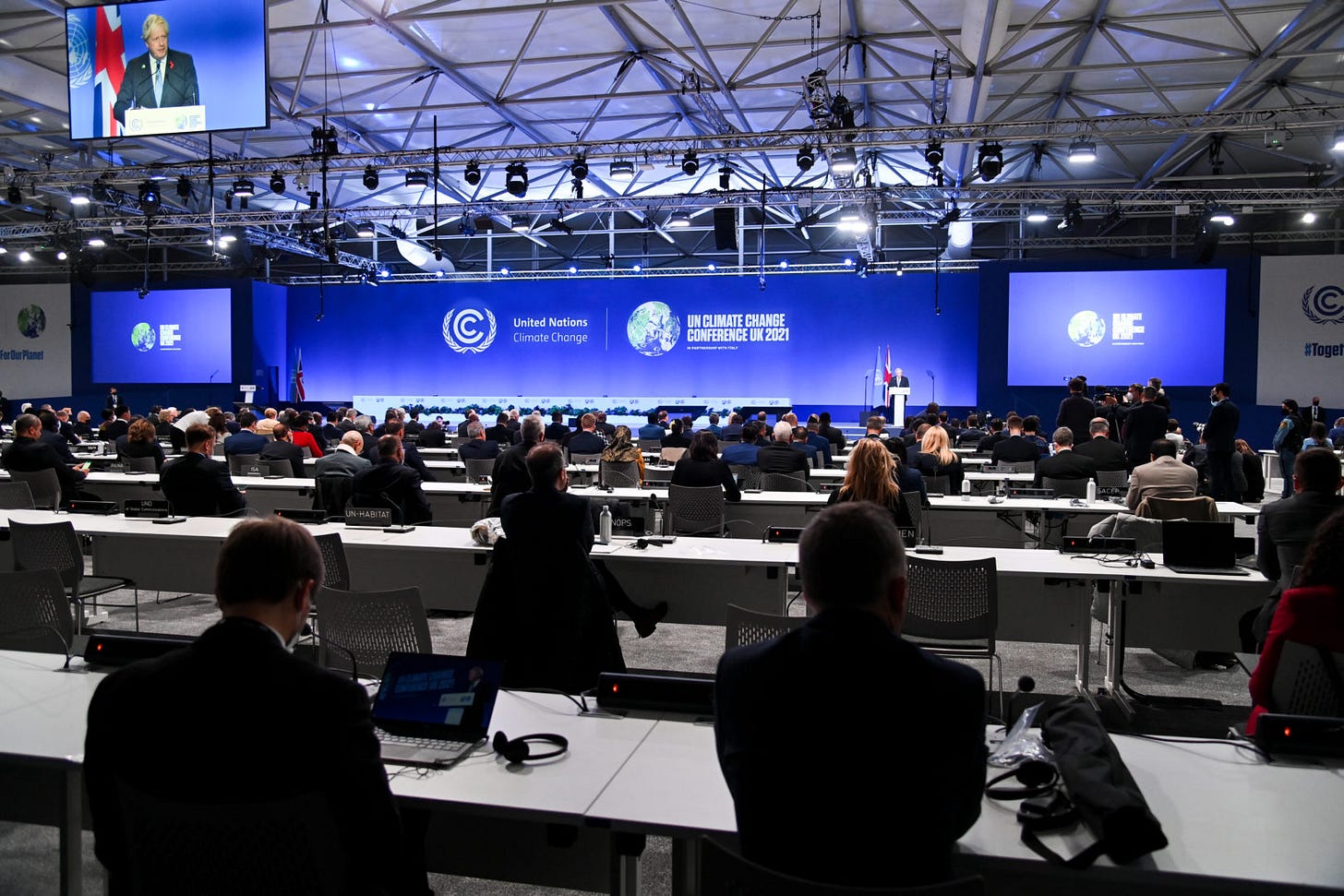The Week in Multilateralism
Friday, November 12, 2021
The Final Hours in Glasgow
The talks at the UN climate change conference are now in overtime. Key sticking points appear to be what the final text will say about fossil fuel subsidies, whether it will call for an end to coal use, and what language it will use to describe the obligation of rich countries to compensate poor ones. Because an agreement depends on consensus, all participating countries must agree on the wording of the final text. As the negotiations scrambled toward the finish line, protesters staged a walkout, the United States and China entered into a modest side agreement, and the UN Secretary General exhorted diplomats to accelerate the pace and ambition of their deliberations.
Delivering Aid, without Aiding the Taliban
The international agencies working in Afghanistan have faced an acute dilemma since the fall of the internationally-backed government to the Taliban: how to continue operations without legitimizing a Taliban government that lacks international recognition. Reuters reported this week on one way in which international organizations are threading that needle:
The United Nations has paid nearly $8 million in salaries to some 23,500 health workers across Afghanistan over the past month, bypassing the Taliban-run health ministry in a test case to inject much needed liquidity into a dire Afghan economy.
The U.N. development agency UNDP and the Global Fund health aid organization teamed up to resurrect a program that had been funded by the World Bank until it suspended assistance when the Taliban ousted the Western-backed Afghan government in August.
Meanwhile, representatives of the “Troika Plus”—Pakistan, China, Russia, and the United States— met this week to consider how to manage relations with the Taliban in the absence of recognition. The communique resulting from the session called on the Taliban to renounce terrorism, permit the education of women and girls, and develop friendly relations with neighboring countries. But it also expressed a willingness to “continue practical engagement with the Taliban to encourage the implementation of moderate and prudent policies that can help achieve a stable and prosperous Afghanistan as soon as possible.” (For an argument that international organizations and individual governments need to expand their dealings with the Taliban in order to avoid a humanitarian crisis, see this recent piece by Erica Gaston.)
A Border Crisis Reverberates in Brussels and New York
The standoff in the border area between Belarus and Poland is spinning up intense deliberations in several multilateral fora. The European Union is considering a new round of sanctions against Belarus, which EU officials accuse of trafficking migrants to the border as a way of generating pressure on the European bloc. NATO’s decisionmaking body, the North Atlantic Council, released its own statement mirroring that assessment of the situation:
We will remain vigilant against the risk of further escalation and provocation by Belarus at its borders with Poland, Lithuania, and Latvia, and will continue to monitor the implications for the security of the Alliance. NATO Allies call on Belarus to cease these actions, to respect human rights and fundamental freedoms, and to abide by international law.
The crisis has received attention in the halls of the United Nations as well. On the edges of a UN Security Council meeting, Russian and Western diplomats exchanged harsh words about who is to blame for the crisis. For their part, UN officials have urged a quick resolution but have been careful about apportioning blame. The UN Human Rights chief, Michele Bachelet, released a statement this week that had tough words for both sides:
The strong security-focused and politically charged responses on both sides – including through the increased deployment of troops – and accompanying inflammatory rhetoric, serve only to exacerbate the vulnerability and risks that migrants and refugees face.
Briefly Noted
The United Nations is choosing new members of the International Law Commission today.
According to one report, the leaders of the “Quad” countries—Australia, India, Japan, and the United States—may soon meet in Japan.
A UN aid official warned that the situation in parts of Myanmar is deteriorating; on Wednesday, the UN Security Council issued its own statement of concern.
Do we need a new global treaty that focuses on crimes against humanity?
At the World Trade Organization, negotiations to reduce fishing subsidies are reaching a critical point.
Portugal cracked down on a crime ring that allegedly involved some of the country’s UN peacekeepers in the Central African Republic.
The World Bank’s troubled Doing Business report—canceled after allegations about improper influence in its rankings—might rise again.
An advisor to the Japanese prime minister is in line to be a deputy managing director of the International Monetary Fund.
A U.S. special envoy met with the African Union’s point person in an attempt to help resolve the crisis in Ethiopia.
A UN Human Rights Rapporteur is visiting the United States to consider the country’s treatment of minorities.
New and Notable Research and Writing:
In the American Political Science Review, several researchers consider the backlash against human rights rulings of European courts—and whether the reaction is about process or substance.
In a new Brookings Institution report, Agneska Bloch and James Goldgeier offer suggestions to NATO as it turns toward the twin challenges of a rising China and accelerating climate change.
The International Peace Institute released a report on UN peacekeeping in the Central African Republic that considered how the mission can balance its various priorities.


